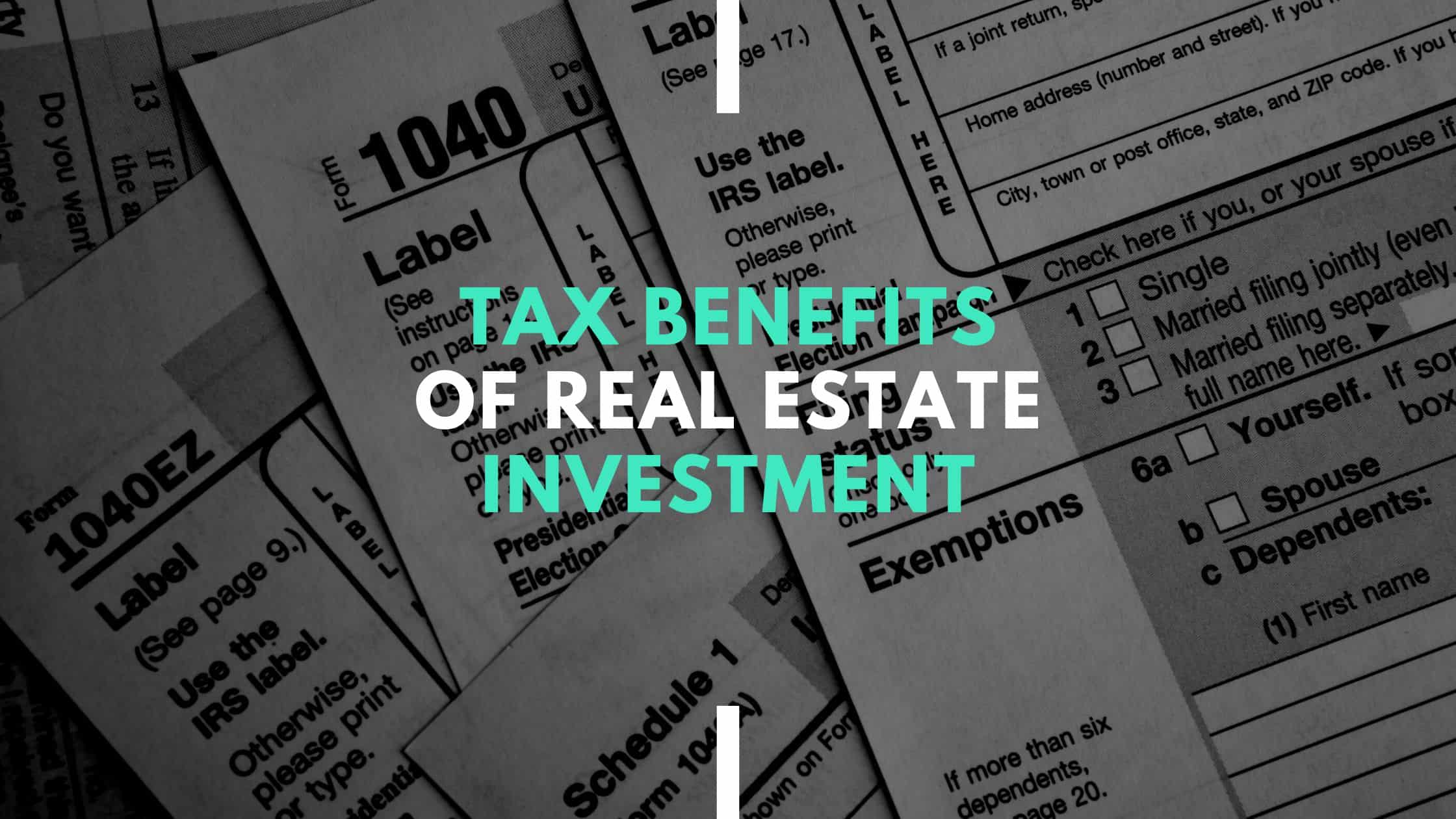Hidden Potential: 7 Tax Benefits of Real Estate You Need to Know!
While we have provided valuable information regarding the tax benefits of real estate investing, we want to remind you that we are not tax consultants, and the information we provide should not be taken as professional advice. It is essential to consult with a qualified tax professional to ensure that you take full advantage of the tax benefits and comply with all applicable tax laws.
Tax laws can be complex and subject to change, and it’s crucial to work with a knowledgeable tax consultant who can provide personalized advice based on your specific circumstances. Working with a professional can maximize your tax benefits while minimizing your tax liability.
Seven Tax Benefits of Real Estate Investment
Real estate investment is a popular way to diversify your portfolio and build long-term wealth. It’s also a great way to enjoy the tax benefits of real estate. This article will discuss the top tax benefits of investing in real estate.

1. Depreciation Deduction
Depreciation Deduction is a fantastic tool for real estate investors. It’s like a magic eraser for your taxable income. Here’s how it works:
- What is it?: Depreciation is a non-cash expense that lets you write off a portion of your property’s value over time. Think of it as an allowance for wear and tear, deterioration, or obsolescence of the property.
- How does it affect my taxes?: This deduction can significantly reduce your taxable income and, therefore, your tax bill.
Here are the specifics on how long you can depreciate different types of properties:
Type of Property | Depreciation Period |
|---|---|
Residential rental property | 27.5 years |
Commercial rental property | 39 years |
Now, how do you take advantage of this?
- You need to determine the cost basis of your property. This includes the purchase price plus any improvements made minus any depreciation already taken.
- Subtract any associated selling costs from this cost basis.
- Divide this adjusted cost basis by either 27.5 or 39 (depending on whether it’s a residential or commercial property).
- The result is your annual depreciation deduction.
Remember, just like with all tax strategies, it’s smart to consult with a tax professional or financial adviser to make sure you’re getting the most out of your investments and staying within the law. Enjoy those tax savings!
To take advantage of the depreciation deduction, you must determine the cost basis of your property and subtract any associated selling costs. Read the full IRS explanation here.
2. Mortgage Interest Deduction
This is another major tax perk for real estate investors. In fact, it’s like a coupon that helps cut down your tax bill. Here’s how it works:
- What is it?: If you have a mortgage on your rental property, you can deduct the interest payments from your taxable income. This is called the mortgage interest deduction.
- How does it affect my taxes?: This deduction can significantly reduce your tax bill and make your investment more profitable.
Now, how do you take advantage of this?
- You need to prove that you’ve paid the mortgage interest during the year. The IRS isn’t just going to take your word for it!
- Keep copies of your loan documents and proof of payments made. This includes canceled checks or bank statements showing payments going toward principal and interest on the loan.
Remember, tax benefits are like tools in your toolbox. The more you know how to use them, the better off you’ll be! As always, consult with a tax professional or financial adviser to make sure you’re maximizing these benefits and staying compliant with tax laws. Happy investing!
Go Publication 936, Part I for a greater understanding of this rule from the IRS.
3. roperty Tax Deduction
Real estate investors can also deduct property taxes on their rental property from their taxable income. The Property Tax Deduction is another great tool in your tax toolbox as a real estate investor. It’s like a tax relief that helps reduce your tax bill. Let’s delve into it:
- What is it?: As a real estate investor, you can deduct property taxes on your rental property from your taxable income. These are usually significant expenses for property owners but can also be tax-deductible under the right circumstances.
- How does it affect my taxes?: This deduction can significantly reduce your tax bill and make your investment more profitable.
Now, how do you take advantage of this?
- The IRS offers a tool, “Can I Deduct My Mortgage Related Expenses”, on their website to help determine if you’re eligible for this deduction.
- Keep in mind that there is an overall limit. As of 2022, the limit was $10,000 for married couples filing jointly, or $5,000 for those filing individually.
Remember, understanding tax rules can be tricky, so it’s always a good idea to consult with a tax professional or financial adviser. Enjoy your tax savings!
4. 1031 Exchange
A 1031 exchange, named after Section 1031 of the U.S. Internal Revenue Code, is a powerful strategy that allows real estate investors to defer paying taxes on the sale of a property. The key to this strategy lies in reinvesting the proceeds from the sale into a new investment property of equal or greater value. By doing so, you can defer paying taxes on your capital gains and use that money to invest in more properties.
The Rules for a 1031 Exchange Here are the main rules you need to know about:
- Identification Rule: Within 45 days of selling your original property, you must identify potential replacement properties.
- Exchange Completion: You have 180 days from the sale of the original property, or until your tax return’s due date (with extensions), whichever comes first, to complete the exchange.
- Like-Kind Property: As per the Tax Cuts and Jobs Act, Section 1031 now applies only to exchanges of real property. Exchanges of personal or intangible property no longer qualify.
- Equal or Greater Value: The new investment property must be of equal or greater value than the property being sold.
- Depreciation: Starting from January 1, 2023, the 100% bonus depreciation introduced by the Tax Cuts and Jobs Act in 2017 has been reduced to 80%.
Additional Considerations There are also some special rules and exceptions to keep in mind:
- Related Parties: The IRS has specific rules for dealing with related parties in a 1031 exchange to prevent tax avoidance.
- Boot: If you receive cash, relief from debt, or property that’s not like-kind, you may have to pay tax on this “boot.”
- Holding Period: There’s no statutory holding period specifying how long you must hold either the relinquished or replacement property.
- Professional Help: Given the complexity of 1031 exchanges, working with a Qualified Intermediary (QI) is often advisable to facilitate the transaction.
Read more about 1031 exchanges, and take full advantage with our comprehensive guide.
5. Passive Loss Deduction
So, you’ve heard of losses, right? Well, in the world of real estate investing, sometimes those losses can actually work in your favor. The Passive Loss Deduction allows investors to deduct up to $25,000 in losses from their rental property from their taxable income. It’s kind of like a silver lining to a not-so-great situation.
Who Qualifies? But here’s the catch: not everyone qualifies. To unlock this deduction, you must be actively involved in managing your rental property. That means you’re making the big decisions like approving tenants, deciding on rental terms, and overseeing maintenance. If you’re paying a property manager to do all the work, this might not apply to you.
The Rules Here are some key points you need to remember:
- Active Participation: You must actively participate in property management. This doesn’t mean you need to fix toilets at midnight, but you should be involved in decision-making.
- Income Limits: If your modified adjusted gross income (MAGI) is $100,000 or less, you can take the full $25,000 passive loss deduction. But if your MAGI is between $100,000 and $150,000, the deduction phases out. And sorry, if you’re making over $150,000, this deduction isn’t for you. (these are always subject to change, so please check to be sure)
- Rental Activity: The IRS defines rental activities as passive activities, even if you materially participated in them, unless you’re a real estate professional.
Extra Tips And here are some extra nuggets of wisdom:
- Keep Records: Document everything. Keep track of the time you spend on rental activities, your decisions, and when you make them. Good records will be your best friend if the IRS ever has questions.
- Work with a Pro: Tax rules can be complicated. Don’t go it alone. A tax professional or financial adviser can help you navigate the ins and outs of passive loss deductions.
6. Capital Gains Tax Exclusion (2 in 5 rule)
The 2 out of 5 rule is a fantastic tax benefit for homeowners in the United States. It’s essentially a way to avoid paying capital gains tax when selling your home, under certain conditions.
Here’s how it works:
- Ownership: You’ve owned the house for at least two years within the last five years before the sale.
- Use: You’ve lived in the house as your main home for at least two years within the past five years before the sale.
If you meet these conditions, you might be able to exclude from your income all or part of any gain from the sale.
The exclusion limits are:
Filing Status | Exclusion Limit |
|---|---|
Single | $250,000 |
Married filing jointly | $500,000 |
Now, let’s get into some specifics:
- The two years of residence don’t have to be continuous. You can live in the home at different times within those five years and it still counts!
- If you’re married, only one of you needs to meet the ownership requirement, but both must meet the use requirement to get the total $500,000 exclusion.
- Special rules apply if you become disabled or if you’re in the military, foreign service, or intelligence community. In these cases, you might still qualify for the full exclusion even if you don’t meet the standard requirements.
Based on the information available as of July 11, 2023, if a homeowner qualifies under the 2 in 5 rule (meaning they have both owned and lived in their home for a minimum of two out of the last five years), they may be able to exclude up to $250,000 of the capital gain from their income if they are single. If they are married and filing jointly, they may be able to exclude up to $500,000 of the capital gain from their income.
Please note that tax laws can change and it’s always best to consult with a tax professional or financial adviser for the most current and personalized advice.
7. Real Estate Professional Status
You can take advantage of additional tax benefits as a real estate professional. Real estate professionals spend over 50% of their time in real estate and meeting other requirements. Real estate professionals can deduct their rental losses from their taxable income without limit and are not subject to passive loss limitations.
- Real Estate Professional Status (REPS): This status allows you to deduct an additional $25,000 of your real estate losses against your ordinary income. However, this deduction phases out gradually as your income increases.
- Passive Activity Rules: Real estate professionals are not subject to passive activity rules, which means they can use losses from their real estate activities to offset any other income.
- Self-Employment Tax: Real estate professionals can avoid self-employment tax on rental income since the IRS considers it passive income.
- Deduction for Home Office: If you use part of your home exclusively for your real estate business, you may be able to deduct a portion of your home-related expenses.
If you are interested in becoming a professional real estate agent, you may be interested to check out my website about becoming a licensed real estate agent: https://realestatelicenseguide.com/
Get Professional Help To Maximize Benefits
In conclusion, we encourage you to consult with a tax professional before making any real estate investing and taxes decisions. With their expertise and guidance, you can navigate the complex world of tax laws and take full advantage of the benefits available to you as a real estate investor.







